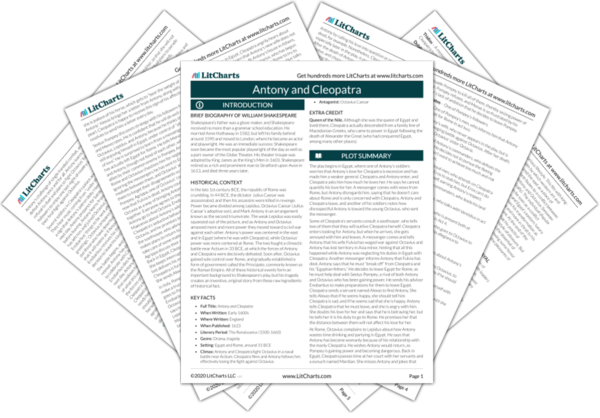Minor Characters
Menas
One of Pompey’s followers. When Octavius, Lepidus, and Antony are all drinking on Pompey’s boat, Menas tries to persuade Pompey to kill all of them, thereby seizing power of Rome. Pompey refuses, and Menas is so frustrated by his master’s lack of ambition that he decides to leave Pompey.
Menecrates
One of Pompey’s followers.
Varrius
One of Pompey’s men, who informs him that Antony has left Egypt for Rome in act two.
Fulvia
Antony’s wife, who never appears in the play, but is mentioned as waging battle against Octavius. After her death, Antony marries Octavius’ sister Octavia.
Ventidius
One of Antony’s commanders, who defeats the Parthians in battle. He decides not to pursue the fleeing Parthians, as he doesn’t want to achieve too much and risk rivaling Antony’s power.
Eros
One of Antony’s loyal men, who attends on Cleopatra and him. Antony asks for Eros to stab him, but Eros can’t do this, and instead stabs himself, earning Antony's respect.
Canidius
One of Antony’s commanders, who leads his land forces at Actium.
Silius
One of Antony’s soldiers, who talks with Ventidius in act three.
Scarus
One of Antony’s soldiers, who is present both at Actium and at Antony’s later victory in Act 4.
Dercetas
One of Antony’s soldiers, who goes to Octavius to tell him of Antony’s death and pledges his allegiance to Octavius.
Demetrius
One of Antony’s soldiers.
Philo
One of Antony’s soldiers, who worries about Antony’s excessive love for Cleopatra early in the play.
Ambassador
An ambassador sent by Antony to Octavius, to ask him to let Antony live either in Egypt or Athens if he should surrender.
Charmian
One of Cleopatra’s servants, who kills herself with an asp after Cleopatra does so.
Iras
One of Cleopatra’s servants, who stays with her until she dies just before Cleopatra commits suicide.
Alexas
One of Cleopatra’s servants.
Mardian
A eunuch in Cleopatra’s court.
Seleucus
Cleopatra’s treasurer, who appears in the final scene of the play.
Diomedes
One of Cleopatra’s servants, who comes to Antony after he has stabbed himself, and tells him that Cleopatra is not dead, as Antony thought, but actually alive.
Maecenas
One of Octavius’ advisors.
Agrippa
One of Octavius’ commanders.
Taurus
One of Octavius’ commanders, who leads his forces at the battle of Actium.
Thidias
A messenger that Octavius sends to try to persuade Cleopatra to betray Antony and join him.
Dolabella
One of Octavius’ followers, who takes pity on Cleopatra in Act 5 and admits to her that Octavius actually plans to parade her in his triumph.
Gallus
A commander under Octavius.
Proculeius
One of Octavius’ soldiers, who tries to persuade Cleopatra not to commit suicide, by lying and saying that Octavius has no plans to humiliate her as a prisoner in his triumph.
Messengers
Throughout the play, numerous messengers appear and deliver news to Antony, Cleopatra, and others.
Soothsayer
A fortune-teller, who predicts early in the play that Antony will have a lesser fortune than Octavius, and warns Antony to stay away from Octavius.
